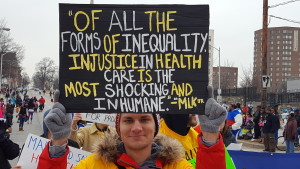Legislative Action
Healthcare-Now of Maryland has secured the introduction and hearings for state single-payer bills for a number of years. For the 2009 legislative session, state level single-payer bills were introduced in both branches of the Maryland Legislature. The bills were both entitled “Maryland Health Security Act of 2009” and contained identical language. The house version, HB 1186, was introduced by Delegate Karen Montgomery and had 33 co-sponsors (more than any other previously introduced bill in the General Assembly). The house bill received a hearing at the Health and Government Operations committee. Similarly, the senate version, SB 881 was introduced by Senator Paul Pinsky and was presented before the Finance Committee. Both bills were referred for further study before the 2010 session. See www.mlis.state.md.us/google_docs$/2009rs for text.
Many have considered these state level bills to be more symbolic because of the federal regulatory hurdles involved. A state level single payer system would require an ERISA waiver ceding federal government regulatory power to the state, as well as waivers to include federal Medicare and Medicaid funds in a state system. As the debate at the national level has been orchestrated to keep single payer out of the spotlight, and the prospects for enactment of a national single payer system seem remote, there is increasing interest in establishing a state single payer system. The California legislature has twice passed a single payer bill and each time Governor Schwarzenegger has vetoed it. Other states, notably Pennsylvania, where the governor has promised to sign single payer legislation, may be approaching the time when a single payer system may be enacted with bipartisan support.
One note of hope at the federal level is that the health reform bill reported out of the tri-committees in the House of Representatives HR-3200, contains a provision entitled “State Innovation” and requires the Secretary of Labor to grant an ERISA (Employment Retirement Security Act of 1974) waiver to any state that wants to create a single payer system. When this amendment (sponsored by Rep. Dennis Kucinich) was added to HR-3200 it passed with support of both Democrats and Republicans. A similar amendment, (sponsored by Senator Sanders) failed in the HELP committee in the senate. Also included in the house bill (HR-3200) were federal funds to enable a state to plan for establishing a single payer system.
Many single payer supporters are directing renewed energy toward establishing a single payer system in Maryland. Canada established its single payer system province by province, starting in Saskatchewan, until the benefits of single payer were so clear that the national government had to act. Healthcare Now of Maryland is now raising funds for a Maryland State study on the effects of a single payer system similar to the one done in 2000 by the Lewin Group. This study would be more comprehensive, looking at the effects on all parts of the health care system including the significant administrative savings, and the economic impact on the state and local governments, the local economy and the citizenry. After an initial transition period single payer systems are predicted to be job creators and should attract new industries to Maryland.






